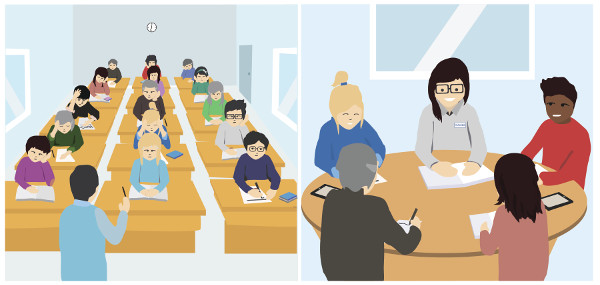- HOUSING
- ARGENTINA
- CHILE
- PERU

Homestay w/ Breakfast & Dinner: $260/week
Shared Apartment (no meals): $165/week
Guided learning and practice are essential to acquiring a solid foundation in Spanish, but to really learn the language, you need to do more than just sit in a room full of people rotely repeating sentences.
It's more beneficial for you to speak conversationally in the language in real life, so they can get an idea of how Spanish is actually used and which speech inflections and patterns are common.
But going out and attempting to use Spanish in crowds can be intimidating. Ecela's conversation classes are specifically designed to make speaking more comfortable for students by limiting the number of people in classes to four, with one teacher.
Classes are designed for results, not grades, so that you look forward to each class, the same way you look forward to sharing lunch or coffee with friends.
This limitation may seem odd because traditional classes (think back to high school, college, adult ed, etc.) can often have 25 or more students in them. It's easier to teach grammar, punctuation, and other fundamental skills to a larger group because there's less of a need for people to speak in those classes.
In conversation classes, however, greater numbers of students in a class are not as effective for learning as smaller, more intimate numbers. By limiting each conversation class to only four students, your turn to speak comes more quickly and more often.
In every class, each person ends up speaking more. But there are other reasons why conversation classes are limited to four students that go beyond a greater amount of participation for each student.
A major benefit of keeping conversation classes small is that reduced numbers of students can help eliminate shyness as a major issue. As an analogy, one can compare public speaking with explaining something to one's friends or family.
Most people are generally able to talk informally to their friends and family without a problem, but if they have to stand up in front of a large group of strangers and make a speech, stage fright can kick in and have unpleasant consequences.
With just three other students and a teacher in the room, conversation classes at Ecela are a lot more like speaking with friends or family instead of addressing a large group. The setting is less formal, and there are fewer people to witness mistakes if any are made.

Left: what many universities consider a "small conversation class". Right: our 4-student micro-class designed for natural communication comfort.
A smaller group also feels friendlier. Conversations can acquire the tenor of friends or acquaintances sitting around and chatting whereas larger groups can often necessitate more structured and less organic types of interaction.
The ability to converse in a friendly manner helps strengthen conversational ability; you get better at responding to actual conversation instead of simply responding to teachers' canned questions.
A side effect of making a mistake in a smaller class is that there's more time to discuss the details of an error because there are usually fewer errors made overall.
That gives you a better idea of how mistakes happen and how they can be avoided.
The result is a better understanding of grammar or other rules in question. With larger classes come the potential for greater numbers of errors, and there's less time to look at the mechanics of each individual error.
Because conversation classes last a couple of hours, and there are fewer people in each group, students get more practice speaking. Anything learned in grammar classes gets a workout.
You won't just say a few words and hang back while everyone else talks; instead, you participate frequently and can practice as much of the language as you know during each class.
There's also more accountability in a smaller group, and it's easier to concentrate on the conversations. If you are in a bigger class, and some of your peers start speaking about a subject that bores you, it's too easy to stop listening and daydream.
In smaller classes, however, topics tend to change quickly, so you are more likely to be more interested in what's being discussed. It will also be easier for teachers to spot any glazed-over looks on students' faces.
Students will still benefit from going out and talking to people outside classrooms. Whether they talk to their host families or to people in shops and offices, they still need real-life practice.
But being in smaller conversation classes will help bring everything together, enabling them to gain more fluency in a shorter period of time.
When you learn Spanish in a combination classroom/immersion setting, you can take advantage of every opportunity they have to speak, read, write, and listen to the language.
All that work will pay off when you suddenly notice that it's become easier to speak and respond in the language quickly.
Note: The limit of four students applies to our conversation class, which is 50% of total course time. The Fundamentals (grammar and structure) section has a max of 8 as continual participation is less important.

Our five-star guarantee promises you an exceptional educational experience every week of your program, or you get TWO extra weeks absolutely free.
We guarantee…

“Our goal is to help you have one of your best experiences ever, but...
"We are real people and, as a consequence, we DO make mistakes, we DO have bad days, and we DO sometimes fail to give your our best.
"If you feel that we failed at any of the above 5 points, at any time during your program, just let me know and we will give you two extra weeks of classes, to be used at any of our schools, absolutely free – no questions asked.” - Cecilia Quezada
Would YOU be Happy at Ecela? Characteristics of our most satisfied students.
Compound Effect of Spanish Immersion 9 factors that work together to get you fluent faster than you might think possible.
Nuestros Barrios Videos from the neighborhoods around our Spanish schools in Argentina, Chile, and Peru.
Reach a level of Spanish you can be proud of
(no obligation, no payment info)

Ecela locations. All schools share the same course content and schedule so it's easy to combine cities for a multi-culture program.
"I love it here...it's so cool and the class sizes are perfect...I wish I could stay forever."
"The teachers are really understanding and very helpful."
(testimonial in Polish)
"This is my second time at Ecela and I've had such great experiences at both."
"I've learned a phenomenal amount of Spanish and made so many great new friends."
"When I came here four weeks ago I didn't know much Spanish but I've learned A LOT."
"I met so many people...new friends from Switzerland, Germany, Australia."
"I knew absolutely zero Spanish when I got here."
testimonial in German
"When I came to Ecela three weeks ago I had no Spanish background...now I can make myself understood in many situations."
"I became so close with many of the other students, and even more so, the administration and teachers."
"In the homestay I feel like I am with my own family"
Making a reservation is easy. You only need to know your start date (Monday of your first week).

*Price notes:
(1) Price does not include (optional) housing, which varies by country. Ecela housing is only available while you are enrolled in our Spanish course.
(2) There is a one-time administrative fee of $100 for first-time Ecela students.
(3) Holidays are factored into the pricing and classes are not rescheduled.
(4) $290 is the prepaid price - you could also pay $350 (space permitting) to "pay-as-you-go."
(5) All of your classes are protected by our Cinco Estrella Garantia.
(6) We have several high demand seasons and urge you to reserve well ahead of time.
(No obligation, no payment info)
Mailing Address
Ecela Oficina Central
Antonio Varas 514
Providencia
Santiago, Reg Met
CP 7500627
Chile